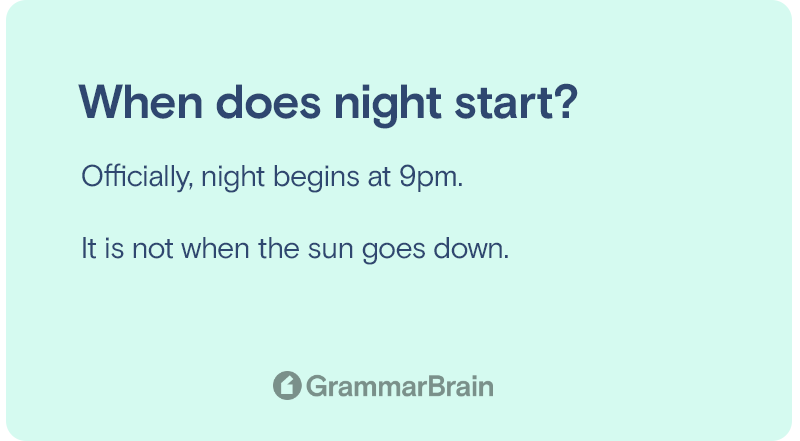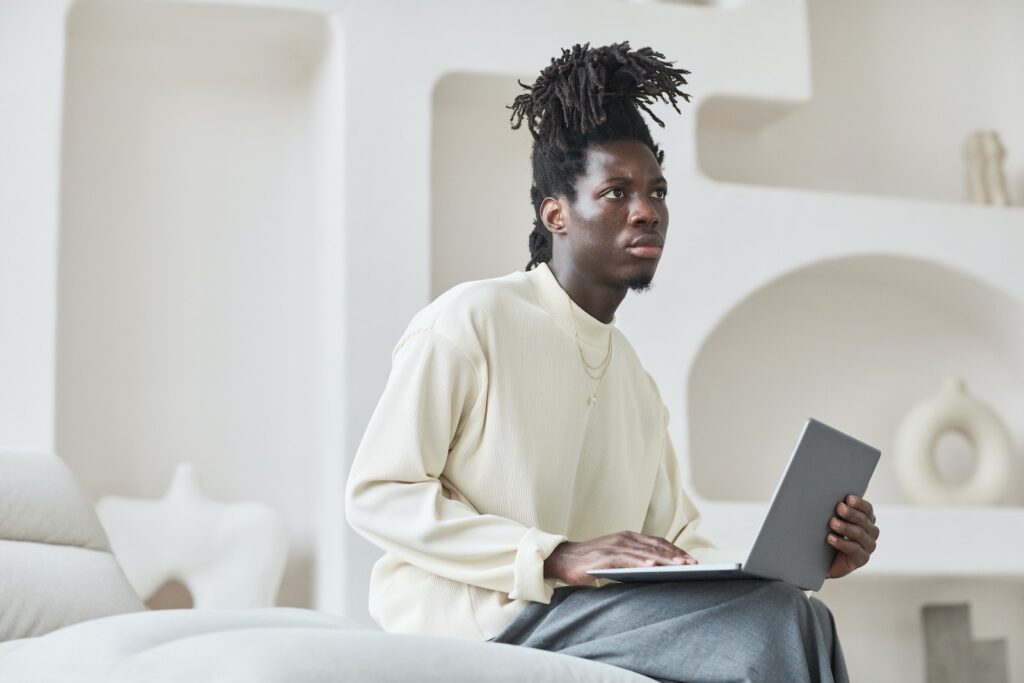When does night start? One day is divided into 24 hours and four central portions. Morning, Afternoon, Evening, and Night are terms used to describe these four portions of the day. The day starts in the morning and ends at night. But, have you ever wondered what is the exact time that these periods start?
The distinction of various times of the day
Now, though we have broadly categorized 24 hours (or 1 full day) into four significant portions, you will also often hear terms like:
- Late morning
- Early morning
- Late afternoon
- Late Evening
- Midnight
- Dawn
- Dusk
All these terms specify a time bracket and not a particular hour or minute.
Similarly, when we talk about the night, it is not an exact time but a bracket.
What does night mean?
To understand what time has been agreed upon as the official time when night starts, we first need to understand what “night” means. “Night” refers to the time of the day when the sun has completely set.
It is a time of atmospheric darkness. It is the time when the day starts to come to an end. It is when people start wrapping up businesses and getting ready to rest themselves to get ready for a new day.
What time does night start?
Like with other facts of life, there’s much debate around what time night starts. Some say that night starts as soon as the sun sets. However, this is not a conclusive resolution given the massive difference in sunset time across different parts of the world.
Some strongly suggest that nighttime starts at 8 pm. This is when most businesses start shutting down for the day, when families get together for dinner, leading to rest.
Since this is when the day comes to an end for most things, it should be the official time when night starts.

8 pm or 10pm?
On the other hand, some suggest that night starts later, at around 10 pm. This is because by 10, everything is wrapped up, and it is time to go to bed. Thus, supporters of this argument believe that night starts at 10 pm.
However, contrary to both these arguments, the most widely accepted time for when night starts is 9 pm. This time has been decided in keeping with the Evening portion of the day. Globally, it is accepted that evening starts a little before the sun sets. This is usually around 5 pm- 6 pm and ends at night.
When does night start, officially?
Given that the sun can set as late as 8 pm in some parts of the world, especially during summer, the 9 pm hour was agreed upon. Thus, to summarize, the night begins at 9 pm.
Once it has started, the night also has different times, like “midnight,” which starts at 12 am. The night ends when the morning starts, at 6 am. 6 am marks the beginning of a new day (officially). Different times of the day start as the preceding portion comes to an end.
FAQs
What hours define “night?”
What time does “late night” start?
Similar to the consensus about the start of night, Midnight is globally accepted to start at 12 AM. This time is considered to be the official start of a new day as well.
Is 8 pm considered night?
Though it is broadly accepted that night starts at 9 pm, some people suggest that night starts at 8 pm. However, in the exercise of proper caution, it is recommended to consider nighttime starting at 9 pm.
Sources
Inside this article
Fact checked:
Content is rigorously reviewed by a team of qualified and experienced fact checkers. Fact checkers review articles for factual accuracy, relevance, and timeliness. Learn more.
Core lessons
Glossary
- Abstract Noun
- Accusative Case
- Anecdote
- Antonym
- Active Sentence
- Adverb
- Adjective
- Allegory
- Alliteration
- Adjective Clause
- Adjective Phrase
- Ampersand
- Anastrophe
- Adverbial Clause
- Appositive Phrase
- Clause
- Compound Adjective
- Complex Sentence
- Compound Words
- Compound Predicate
- Common Noun
- Comparative Adjective
- Comparative and Superlative
- Compound Noun
- Compound Subject
- Compound Sentence
- Copular Verb
- Collective Noun
- Colloquialism
- Conciseness
- Consonance
- Conditional
- Concrete Noun
- Conjunction
- Conjugation
- Conditional Sentence
- Comma Splice
- Correlative Conjunction
- Coordinating Conjunction
- Coordinate Adjective
- Cumulative Adjective
- Dative Case
- Determiner
- Declarative Sentence
- Declarative Statement
- Direct Object Pronoun
- Direct Object
- Diction
- Diphthong
- Dangling Modifier
- Demonstrative Pronoun
- Demonstrative Adjective
- Direct Characterization
- Definite Article
- Doublespeak
- False Dilemma Fallacy
- Future Perfect Progressive
- Future Simple
- Future Perfect Continuous
- Future Perfect
- First Conditional
- Irregular Adjective
- Irregular Verb
- Imperative Sentence
- Indefinite Article
- Intransitive Verb
- Introductory Phrase
- Indefinite Pronoun
- Indirect Characterization
- Interrogative Sentence
- Intensive Pronoun
- Inanimate Object
- Indefinite Tense
- Infinitive Phrase
- Interjection
- Intensifier
- Infinitive
- Indicative Mood
- Participle
- Parallelism
- Prepositional Phrase
- Past Simple Tense
- Past Continuous Tense
- Past Perfect Tense
- Past Progressive Tense
- Present Simple Tense
- Present Perfect Tense
- Personal Pronoun
- Personification
- Persuasive Writing
- Parallel Structure
- Phrasal Verb
- Predicate Adjective
- Predicate Nominative
- Phonetic Language
- Plural Noun
- Punctuation
- Punctuation Marks
- Preposition
- Preposition of Place
- Parts of Speech
- Possessive Adjective
- Possessive Determiner
- Possessive Case
- Possessive Noun
- Proper Adjective
- Proper Noun
- Present Participle
- Prefix
- Predicate



